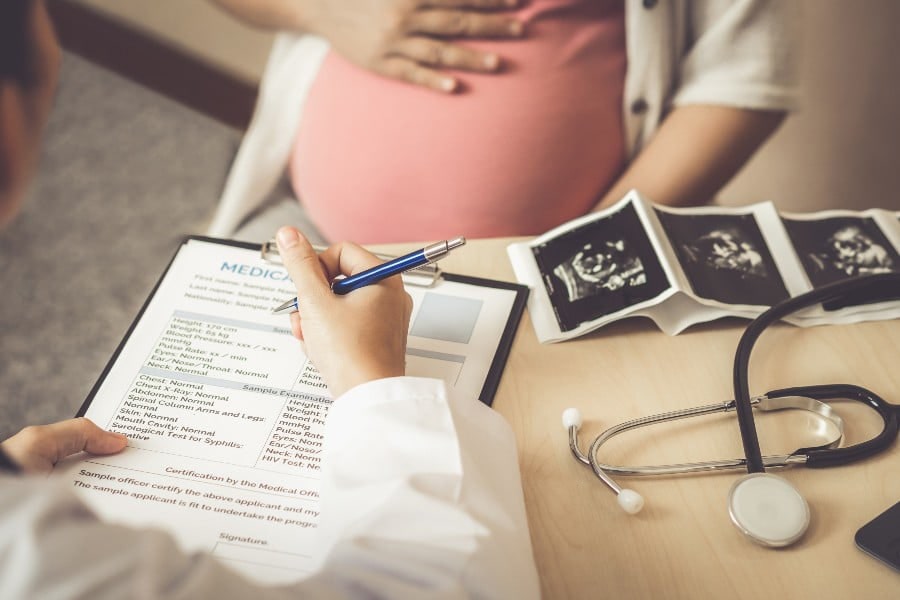Is Pregnancy Possible After a Thyroidectomy?
What is the Thyroid?
Imagine a small butterfly-shaped organ nestled at the base of your neck. That's your thyroid. It oversees many vital functions, such as digestion and reproduction, and even influences your mood. But when it malfunctions, watch out! You'll notice it quickly: fatigue, hair loss, difficulty getting pregnant... And if your situation worsens and your doctor recommends removal of your thyroid? Is it possible to get pregnant after a thyroidectomy?
Thyroid Removal and Pregnancy
Thyroid removal, or thyroidectomy, can raise particular questions and concerns for women of childbearing age, especially when considering pregnancy. After a thyroidectomy, it's essential to manage thyroid hormone levels with hormone replacement therapy, usually in the form of levothyroxine. Close monitoring by an endocrinologist is crucial to ensure hormone levels remain stable and adequate, as imbalances can affect fertility and pregnancy progression. Once hormone levels are properly adjusted, most women can conceive and have a healthy pregnancy. During pregnancy, regular check-ups are essential to adjust hormone dosage and meet the body's increasing needs. In collaboration with their medical team, women who have undergone thyroid removal can experience a fulfilling pregnancy without major complications, ensuring the health and well-being of both mother and child.
Infertility After a Thyroidectomy
Is it easy to get pregnant after a thyroidectomy?
While it's entirely possible to get pregnant after a thyroidectomy, patients with thyroid disorders may experience a rare obstacle, primary ovarian insufficiency, which can lead to infertility. This condition occurs when the ovaries are attacked by proteins and white blood cells, leading to a decrease in their size, premature menopause, lack of ovulation, and the inability to conceive. In case of hypothyroidism after surgery, the menstrual cycle may also be disrupted. Indeed, hypothyroidism can completely stop periods, often causing heavy bleeding and severe cramps. When your menstrual cycle is affected, it can make pregnancy more difficult.
Do thyroid disorder treatments prevent pregnancy?
If you undergo radioactive iodine therapy, you may experience fertility problems and have difficulty conceiving. For men, high doses of iodine can reduce sperm count and in rare cases, cause sterility. In women, it can affect the ovaries and cause irregular periods for up to a year after treatment. Some doctors recommend waiting six months to a year after treatment before attempting pregnancy for patients who have undergone radioactive iodine therapy.
Building a Strong Foundation for Pregnancy
To ensure a healthy pregnancy, it is essential to consider several factors such as physical activity, adequate diet, and proper nutrition. Avoid the temptations of fast food and processed foods, opting instead for healthy and nutritious foods, and if possible, organic. Remember to prioritize lean and low-fat proteins, and discuss with your doctor about taking a multivitamin suited to your needs. And if you are unsure about your diet, don't hesitate to consult a registered dietitian for personalized advice.

The Importance of TSH Monitoring Before and During Pregnancy
Once you are pregnant, it is very important to consult your doctor immediately. TSH monitoring is important when you are trying to conceive, but it becomes even more critical once you are pregnant. Ensuring early monitoring is of great importance, as maintaining a normal TSH level during pregnancy is essential. Thyroid hormones are particularly unstable during the first 10 weeks of pregnancy, which may require an increase in the thyroxine dose, especially during the first 10 to 12 weeks. Studies have also revealed a correlation between high TSH levels and an increased risk of miscarriage.
QUICK QUOTE
You would like more information
Your health, our priority.
Request your free quote
Thyroxine Treatment During Pregnancy
As a future mother, it is crucial to maintain a stable TSH level throughout your pregnancy, especially during the first trimester. If you have undergone a thyroidectomy, you may be wondering if thyroxine treatment is safe for your baby. Fortunately, you don't have to worry because doctors assure that this medication is safe during pregnancy and is even essential to prevent miscarriages and other health problems. Make sure you take your thyroxine correctly to ensure the well-being of your unborn baby.
Thyroxine doses are essential for having a healthy baby. At about 12 weeks of pregnancy, the baby needs its own thyroid hormones to properly develop its brain. During the first trimester, your body supplies these hormones, making these 3 months crucial. During a normal pregnancy, your thyroid gland enlarges to produce enough hormones for you and the baby. It is therefore likely that you will need to increase your thyroxine dose during pregnancy to maintain adequate hormone levels. It is important to consult an endocrinology specialist to monitor your TSH levels and ensure that you and your baby are healthy.
Breastfeeding After a Thyroidectomy
Considering breastfeeding after a thyroidectomy is a very personal decision, varying from mother to mother. However, there are a few important things to keep in mind. First of all, it is crucial to note that some radioactive isotopes may be present in your milk if you have undergone a thyroidectomy. Therefore, it is strongly discouraged to undergo scans or isotopic tests during the breastfeeding period. If you need to undergo high-dose radiotherapy, it is best to discuss it with your doctor beforehand.
Did you know that it is perfectly safe to breastfeed while safely taking thyroxine? Indeed, this hormone is secreted in your milk. According to medical experts, provided a dose is taken within a safe range, it is safe to breastfeed while taking this medication.
How are thyroid problems treated in pregnant women?
During pregnancy, radioactive iodine treatments are not recommended. On the other hand, synthetic antithyroid drugs and beta-blockers are prescribed to restore hormonal balance. Sick leave for pregnant women and rest are also strongly recommended.
The administration of these treatments is closely monitored due to potential interaction with the fetus.